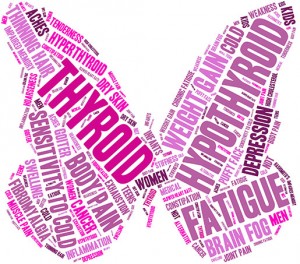 What is hypothyroidism and how does it affect weight gain and weight loss?
What is hypothyroidism and how does it affect weight gain and weight loss?
The thyroid is a gland in the body, located at the base of the neck, which is responsible for producing a hormone that helps to regulate your basal metabolic rate (BMR). Your basal metabolic rate is the rate at which you burn calories when you are at rest. On the basic level and stated simply: For most people with hypothyroidism, there is not enough of the thyroid stimulating hormone (TSH) produced to keep your BMR at a high enough functioning level to provide natural calorie consumption. For some women, they are producing enough TSH, but there is a problem with their pituitary gland that doesn’t allow the body to distribute and use the hormone. This is a reason why women with hypothyroidism have such a difficult time with weight gain and weight loss. (Here is more detailed information on how doctors test for this condition)
Symptoms – From WebMD
- “Coarse and thinning hair.
- Dry skin.
- Brittle nails.
- A yellowish tint to the skin.
- Slow body movements.
- Cold skin.
- Inability to tolerate cold.
- Feeling tired, sluggish, or weak.
- Memory problems, depression, or problems concentrating.
- Constipation.
- Heavy or irregular menstrual periods that may last longer than 5 to 7 days.”
Does hypothyroidism affect women only?
No. Hypothyroidism is talked about almost exclusively in regards to women as it is more common than with men occurring at a 10 to 1 ratio. For women, it is more common for people of Caucasian backgrounds closely followed by Hispanics and blacks. That said, it is important to realize that there is more clinical work that is starting to show that hypothyroidism is more common in African American men than previously thought.
How does it affect weight gain and loss?
Simply put, if you have hypothyroidism you could have a difficult time gaining or losing weight. What will develop as symptom depends on other metabolic factors but it is common for women to continue to have unexplained weight gain, or have a difficult time losing weight even when engaged in calorie restriction and extra exercise routines. One of the hallmark symptoms of hypothyroidism that also adds to difficulties reducing weight is fatigue, depression, constipation, muscle weakness and/or pain and a slowed heart rate. Any one of those additional symptoms by themselves will complicate weight loss, but when added to the metabolic problems caused by hypothyroidism it can make weight issues even more difficult to control.
If I have had this problem all my life, why am I just finding out now?
Many women with hypothyroidism have had the condition all of their life, but they are usually not diagnosed with it until the onset of menopause or a related symptom, like weight gain, that significantly affects their health. With menopause, it is with the shift in the hormonal balance of the body that the imbalance in TSH becomes most glaringly apparent through its symptoms. Many women aren’t diagnosed early because they attribute fatigue and weight gain to the natural process of aging or other factors. By the time the problem is diagnosed, they may have to go on medication or hormone supplements to ease the issue.
Why doesn’t the doctor just give me more of the hormone?
Hormone supplementation is something not to be undertaken lightly, as all too many women of another era discovered when the effects of estrogen supplementation were revealed. If your doctor suspects that you have hypothyroidism they may do a test on your TSH levels to more accurately determine if your body is producing too little, too much or just enough but the pituitary is not delivering it before they decide the best course of action to pursue. Unless your T4 levels are in the extremely abnormal ranges where life threatening conditions could develop, your doctor will probably look toward diet, supplementation and lifestyle changes to see if they can jump start the system naturally. Often, this is done with a very small and manageable does of TSH supplementation that isn’t cause for worry.
Approaching balance in stages
The important thing to remember if you are diagnosed with hypothyroidism is that it helps to put how your body works into context. Hypothyroidism alone doesn’t cause weight gain, loss or prevent either. The gland and hormones work in conjunction with many other elements of your metabolic system. Just tackling one issue as the cure-all isn’t going to work and an approach to achieving healthy basal metabolic rate should occur in stages. There are instances where hypothyroidism can lead to life threatening disorders. If you suspect that your thyroid may be causing you problems, talk to your doctor so they can perform the right tests and evaluations to find out for sure. If you have already been diagnosed, it is important that you seek medical help and help with maintaining a lifestyle that will support you having a healthy thyroid and healthy hormone levels.
Here is more info on African Americans and Hypothyroidism.


Andrea says
Regarding the what foods to avoid pamphlet, does that list apply to those WITHOUT a thyroid?
Ajima Jackson says
You’d need to speak with your doctor about that.
Melody says
Im notvsure I agree withvthese statements.where is the scientific studies and references resources where you got your info?
Pam says
to Melody when eating those veggies raw you feel sluggish bug cooking them helps. My cancer dr told me this about 12 years ago. You’ll feel better if they are cooked.